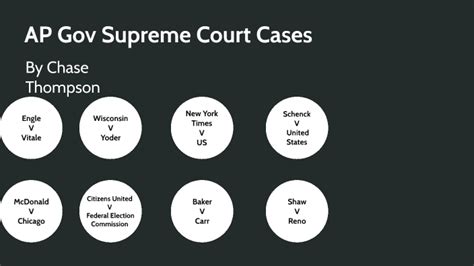In the labyrinthine halls of American jurisprudence, the Supreme Court stands as the final arbiter, its decisions shaping the very fabric of society. For students of AP Government, understanding the pivotal court cases that have defined our legal landscape is essential.

Key Concepts to Grasp
Judicial Review: The power of the Court to determine whether laws or executive actions are constitutional.
Originalism vs. Living Constitution: The opposing schools of thought on how to interpret the Constitution. Originalism adheres to the intent of the framers, while the living Constitution allows for evolving interpretations.
Landmark Supreme Court Cases
Marbury v. Madison (1803): Established the principle of judicial review.
McCulloch v. Maryland (1819): Affirmed the federal government’s implied powers under the Necessary and Proper Clause.
Gibbons v. Ogden (1824): Expanded the federal government’s power over interstate commerce.
Dred Scott v. Sandford (1857): Ruled that African Americans were not citizens and could not sue in federal court.
Plessy v. Ferguson (1896): Established the “separate but equal” doctrine, allowing for racial segregation.
Brown v. Board of Education (1954): Overturned Plessy v. Ferguson, declaring racial segregation in public schools unconstitutional.
Gideon v. Wainwright (1963): Guaranteed the right to an attorney for criminal defendants who cannot afford one.
Miranda v. Arizona (1966): Requires police to inform suspects of their rights before custodial interrogation.
Roe v. Wade (1973): Established the right to an abortion in the first trimester.
Citizens United v. FEC (2010): Prohibited restrictions on corporate political spending.
Cases that Expanded Federal Power
| Case | Year | Issue | Ruling |
|---|---|---|---|
| McCulloch v. Maryland | 1819 | Implied powers of the federal government | Upheld federal power over state regulations |
| Gibbons v. Ogden | 1824 | Interstate commerce | Extended federal authority over commerce across state lines |
| United States v. Curtiss-Wright Export Corp. | 1936 | Foreign affairs | Granted broad powers to the executive branch in foreign policy |
| Heart of Atlanta Motel, Inc. v. United States | 1964 | Civil Rights Act of 1964 | Upheld federal government’s power to regulate businesses that affect interstate commerce |
| National Federation of Independent Business v. Sebelius | 2012 | Affordable Care Act | Upheld federal authority to create individual health insurance mandates |
Cases that Protected Individual Rights
| Case | Year | Issue | Ruling |
|---|---|---|---|
| Marbury v. Madison | 1803 | Judicial review | Established the power of the Court to declare laws unconstitutional |
| Gideon v. Wainwright | 1963 | Right to counsel | Guaranteed legal counsel to criminal defendants who cannot afford it |
| Miranda v. Arizona | 1966 | Miranda rights | Required police to inform suspects of their rights before questioning |
| Roe v. Wade | 1973 | Abortion rights | Established the right to an abortion in the first trimester |
| Obergefell v. Hodges | 2015 | Same-sex marriage | Legalized same-sex marriage in all 50 states |
Common Mistakes to Avoid
- Misinterpreting Originalism: Originalism is not about blindly following the original meaning of the Constitution. It allows for reasonable interpretations based on the intent of the framers and society’s evolving values.
- Oversimplifying Judicial Review: Judicial review is not a rubber stamp. The Court carefully weighs the constitutionality of laws and actions, considering legal precedent and evolving societal norms.
- Confusing stare decisis with precedent: Stare decisis is the principle of following prior decisions. However, precedent can be overturned if the Court finds it no longer comports with evolving societal values or constitutional principles.
- Assuming the Supreme Court is always right: The Supreme Court is composed of humans who are subject to biases and limitations. Its decisions are not infallible and can be challenged and overturned.
Why Supreme Court Cases Matter
- Shape the fabric of our society: Court decisions impact our daily lives, from our individual rights to the role of government.
- Ensure accountability: The Court holds the government and other institutions accountable for their actions and ensures they adhere to constitutional principles.
- Protect minorities: The Court has often been the champion of minority groups, protecting their rights and safeguarding their interests.
- Provide stability and unity: By resolving legal disputes, the Court provides stability and promotes unity within the nation.
- Inspire social change: Landmark decisions have sparked major social and political transformations, such as the Civil Rights Movement and the expansion of LGBTQ+ rights.
Benefits of Studying Supreme Court Cases
- Develop critical thinking skills: Analyzing court cases requires students to critically evaluate evidence, apply legal reasoning, and make logical arguments.
- Understand the Constitution and its principles: Studying court cases helps students grasp the complexities of the Constitution and how it is interpreted and applied in real-world scenarios.
- Become informed and engaged citizens: Understanding Supreme Court cases equips students to participate meaningfully in civic debates and make informed decisions about public policy.
- Prepare for higher education and legal careers: Court cases are essential reading for students pursuing degrees in law and related fields.
- Appreciate the role of the judiciary: Studying court cases gives students a deeper appreciation for the important role the judiciary plays in our political system and society as a whole.
Conclusion
Navigating the labyrinthine world of AP Government Supreme Court cases is not for the faint of heart. But by understanding key concepts, studying landmark decisions, and avoiding common pitfalls, students can develop the skills and knowledge necessary to navigate this complex legal landscape and become informed, engaged citizens. Remember, the Supreme Court is not merely a collection of texts but a living, breathing entity that continues to shape the destiny of our nation.
